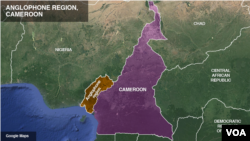Cameroon military officials say separatists have abducted and tortured several hundred civilians they accuse of violating a lockdown the fighters have imposed in the English-speaking western regions every Monday. The claim has prompted renewed condemnation of human rights abuses by separatists.
Voices of Cameroonians crying for help and begging for their lives to be spared can be heard in an audio clip from a video circulating on social media platforms, such as Facebook and WhatsApp, as armed men appear to order 17 people out of a bus. The armed men brandish AK-47 rifles and threaten to kill anyone who disobeys their orders. Among the 17 people are four women carrying babies.
English-speaking separatists on social media say they took and shared the video. Cameroon military confirms it was taken by separatists in the South West region.
The armed men then force all the occupants of the bus to lie down before beating them with sticks and machetes for more than 10 minutes. In the video, a man presenting himself as a fighter says his group is punishing civilians who do not respect the Monday lockdown imposed by separatists in Cameroon’s English-speaking regions.
Cameroon military officials say the attack was carried out by fighters on people traveling between Buea and Kumba, both commercial cities in the English-speaking South West region. Military officials say similar attacks and abductions by fighters were reported in several other English-speaking towns, including Mamfe, Ekona and Tiko.
Officials also said an improvised explosive device planted by the fighters killed a taxi driver in Buea.
Last week, separatists said on social media they killed four people who collaborated with government troops to kill a man known as Cross and Die, one of the fighters' self -proclaimed generals. Military officials confirmed troops had killed Cross and Die.
One separatist armed group, known as the Ambazonia Defence Forces, ADF, also on social media, said it carried out many attacks and abductions on hundreds of civilians in several towns for disrespecting the Monday lockdown ordered by separatists.
Didimus Epie, a 37-year-old cocoa seller, says he was abducted in Ekona. He says his abductors accused him of disobeying orders by separatists that no one should be seen in public places on Mondays.
"The environment is so hostile, and we are just praying that one day the situation should get better, but for now it is very bad. On a daily basis when we go about our duties, we expose ourselves to grave danger," he said.
Epie said he paid a $500 ransom to secure his release from a separatist camp in a bush.
Bernard Okalia Bilai, governor of the South West region, says civilians should not respect calls by separatists to keep their businesses sealed on Mondays.
"I expect everyone to support [the military] by denouncing any form of disturbances or disorder that they notice in their community. People should not hesitate to contact their local administrative authorities, forces of law and order (military) or any other dignitary in their community to denounce any strange persons, so we must continue to remain vigilant," he said.
Bilai said the military has been instructed to protect civilians and their businesses from fighters who want economic activity grounded on Mondays.
Separatists have imposed a lockdown of economic activity in the English-speaking region on Mondays since 2017 as a sign they control the territory.
Violence erupted in 2017 in Cameroon's English-speaking regions, when teachers and lawyers protested alleged discrimination at the hands of the French-speaking majority. The military reacted with a crackdown and separatist groups took up weapons, claiming that they were acting to protect civilians.





